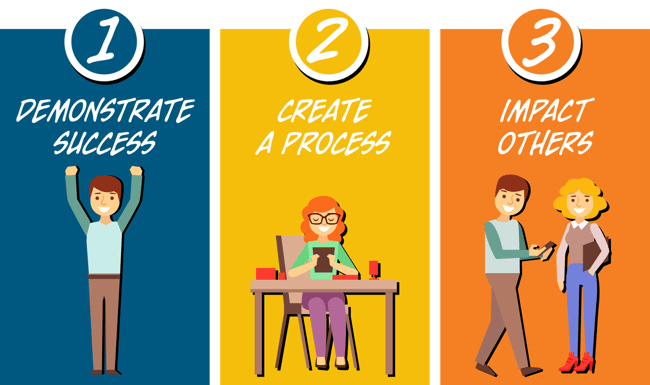The true reward of growth, success, and consequently learning the most, comes when the right mindset is applied to a challenging situation that others may have flagged as second-rate.
I still remember the day I made the phone call. It was to a friend who worked for a cellular company as a store manager. Just weeks prior, I told him I would never work in that industry.
Why not? First, it was a retail job in the mall. You know the type: the one where in the early 2000’s the reps would hassle you in the hallway of the mall offering every passerby a free cell phone. Second, it was not the finance job I wanted. Afterall, I wanted to be a CFO, and I was about to graduate with my degree — which I thought would qualify me for any finance job out there.
I am not alone in this thinking. Many young professionals find themselves looking for:
- the perfect role
- one that aligns with all the ideals our pedagogical system imprints upon us
- one that brings the prestige and honor we should have after investing so much money and time into education
So, what happened to me?
The phone call set me up for an interview and a subsequent job offer. It certainly wasn't because I nailed the interview, but because the Regional Manager desperately needed help. The offer came with a caveat. It sounded something like this, “You’ll be managing our worst store, but we will give you an aggressive pay plan. If you just improve performance a little bit, you will make what you need to.”
Day 1 on the job I sat in the back room of a store which served as a regional training area. My Regional Manager took me through a crash course on selling a phone. He said numerous times, “You will probably forget everything anyway, so we may as well just get on the floor and let you learn … like I did.”
Day 2 was that day of reckoning, and sure enough he was right. I didn’t remember anything. We worked a shift together. He introduced me to my staff — of one, and we sold a phone. (When I see we, I mean my Regional Manager did.) At the end of the day, he assured me that I would be good in a few days.
Day 3 I showed up to my shift and got a message from my Regional Manager that he was sick and wouldn’t be in. So, it was just me. After a few hours of saying “hello,” I was amazed when I sold my first phone. The problem, I couldn’t activate it. I called my friend who worked in another store to have him walk me through the activation process. After activating the phone (by serial number on a PC), I located the phone to turn it on, and to my surprise it was an empty box. I then learned how to un-activate a phone and set-up a new phone all with one customer.
I could continue to tell the details of what happened next, but this is the cliff notes version. I quickly realized that I needed to set myself and the store up for success. Which meant we needed organization, a process, and frameworks that would allow us to succeed.
Day 4 I went to work early in the morning to clean the kiosk, organize it, and set up an inventory and paperwork system which ensured all inventory was accounted for and all paperwork was correct at the start and end of every shift. The next weeks were spent writing, practicing, and teaching our team this “sales process.” By the end of the first month, we had taken our kiosk from 2 employees to 4, from 16 phone activations to 144 activations, and reduced our operational loss and error to nearly zero. On top of that, we became the top grossing store in our company.
My success didn’t come from landing the perfect or ideal role out of college. It came from a job I initially didn’t even want. In hindsight, I was fortunate to have had the opportunity to take over the “worst” store in the company. It was an opportunity to make the biggest impact, and it forced me to learn how to do things different. As a result of taking on this hard task, I was able to replicate the process when I was asked to lead my former peers and their regions. After turning around two regions, our company President knew my team’s successes weren’t merely accidental, and he promoted me to be his Vice President. In the end, I went from kiosk manager to VP of Sales within 8 months.
Based on what I have learned from my own experiences, I have identified a 3-step process that anyone can follow to create their own success in their career.

-
Demonstrate Success. Regardless of what the task or objective is of your current role, it is critical to demonstrate a tenure of meeting or exceeding the requirements of the job. Ultimately, you need to learn to lift where you stand. That means there is nothing you’re too good for. Become the best at whatever you are doing and master it the way no one has. Make sure you illustrate consistent, repeatable success. This is important because it demonstrates to your leadership that not only are you a reliable contributor to the organization, but that your success is not accidental.
-
Create a Process. Now that you are demonstrating repeatable success, it’s important to recognize how you got there. Create and document the key processes which have allowed you to replicate your success over time. If you are a sales person, you need to highlight the process by which you engage your customers to move them along the purchasing path. If you are a communication manager, you need to demonstrate the process that allows you to meet deadlines and deliver quality content. Documentation of these processes is critical.
-
Impact Others. The next step is to find a way to leverage your process to impact other people, programs, and/or the company. As you achieve success, you will have credibility to influence others around you. With your documented process in hand, you are now in the perfect position to elevate others by helping them succeed or even lift an entire team or division’s performance by sharing your best practices. If you are a sales person, impact your teammates by teaching your process that will help them reach their quotas. If you are the communication manager, you might provide your successful process template to another department for implementation.
I hope when you apply my process in your own career, you find success too! Ultimately, as you look for ways to set yourself up for success, push yourself to your limits. Find mastery in everything you do, never quitting before you make it better than when you started. Create your process, then share it!
Do you want to hear more? Listen to this podcast where Joel is invited to tell his full story, From Kiosk to VP.







